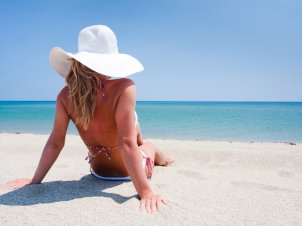7 Tips for Treating Sunburn
By Jessica, August 2, 2012

There’s nothing like painful sunburn to remind you of the dangers of UV exposure. While swearing you’ll wear sun cream every day for the rest of your life is a commendable oath to take, it offers little in the way of immediate relief for your roasted skin. If homemade burn treatments aren’t working, try some of these useful tips for soothing red and peeling skin.
1. Anti-Inflammatories
If the pain and swelling is unbearable, opt for an advil or ibuprofen over a paracetamol. Both have anti-inflammatory properties, so they’ll reduce the inflammation as well as relieve some of the pain. Follow directions on the box for dosage and don’t continue use for more than a day or two without checking with your doctor.
2. Know your Moisturisers
Once you’re not blistered, applying a moisturiser can be a good way to reduce the lifespan of your burn. Effective cooling ingredients to look out for include aloe vera and tea tree oil, but make sure to avoid anything with alcohol. Moisturisers should be avoided if your skin is blistered.
3. Cold Compress
Gently patting your entire body down with a small wet towel isn’t always relief enough for a bad all-over burn. One tip is to slip into some clothes that are just out of the washing machine (completely rinsed of detergent) for head to toe relief.
4. Don’t Pop
If your skin develops blisters, do not pop them. This can happen in extreme cases and is your body’s way of protecting exceptionally raw skin. Let your skin heal until the blisters subside before applying any lotions.
5. Cold Shower
Avoid hot baths or showers after a burn, as it can inflame the skin further. Cold baths can offer some relief, and adding kitchen cupboard ingredients such as oatmeal, milk or green tea is said to help. Avoid fragranced soaps.
6. Avoid Further Irritation
It may seem obvious, but avoid further sun exposure while your burn heals. Long trousers and sleeves, a hat and the shade are your best bet for complete protection as your skin may be too sensitive for adequate sun cream application. Also to be avoided are tight-fitting clothes and rough towel-drying.
7. Re-hydrate
Make sure to drink plenty of water after a day in the sun – if you’re burnt then it’s very likely that you’re dehydrated too. At its worst, this can develop into sun stroke and lead to serious illness, so make sure to thoroughly re-hydrate your body from the inside out. Avoid diuretics such as caffeine and alcohol.
Remember if your sun burn is severe and blisters excessively, or if it’s accompanied by symptoms such as fever, chills or nausea, you should see a doctor immediately for treatment for sun stroke.




